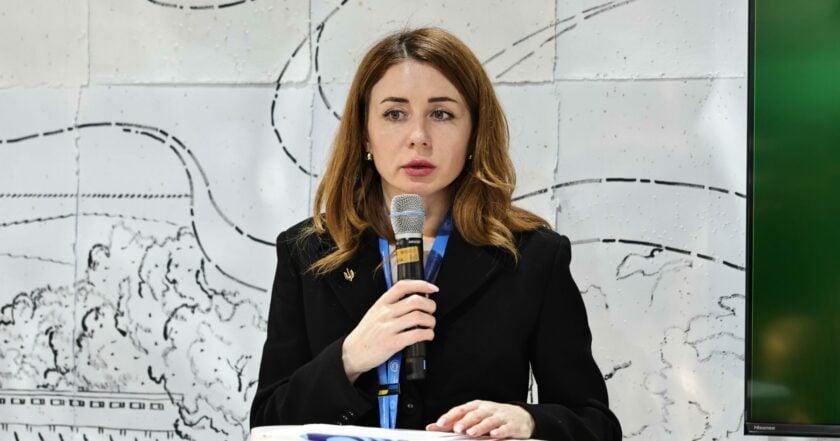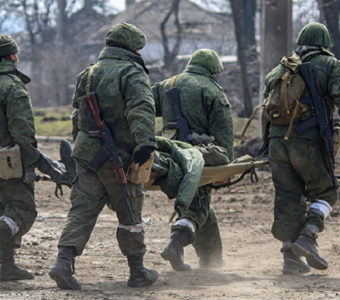$71 Billion in Damages and 180 Million Tons of Emissions: Ukraine Highlights Environmental Impact of 1,000 Days of War at COP29

Over 1,000 days of war, the environmental damage caused by military actions is estimated to be $71 billion. Due to shelling and forest fires, an additional 180 million tons of carbon has been released into the atmosphere. These figures were stated by Ukraine's Minister of Environmental Protection and Natural Resources, Svitlana Grynchuk, at the press-conference, at the United Nations Climate Change Conference (COP29) in Baku.
"During the full-scale invasion, Russia has committed over 6,500 environmental crimes. More than 6 million Ukrainians have been forced to seek temporary refuge in various European countries, resulting in an additional 3.3 million tons of СО2 emissions. The total greenhouse gas emissions caused by the war amount to 180 million tons," noted Svitlana Grynchuk.
According to the Minister, due to hostilities and forest fires over nearly 3 years of war, the carbon absorption potential of Ukraine's forests has decreased by 1.7 million tons. Overall, 3 million hectares of forests have been destroyed as a result of the war. The area of Ukraine contaminated with explosive remnants is 139,000 square kilometers—twice the size of Azerbaijan.
"Even in a peaceful European city, the air may contain traces of an exploded Russian missile. Combustion products released into the air by Russia's missile strikes have already reached Romania, Moldova, Bulgaria, Hungary, Latvia, Lithuania, Estonia, Serbia, Croatia, and Poland," emphasized Svitlana Grynchuk.
The minister highlighted that Ukraine is actively working on restoration without waiting for the war to end. "To compensate for forest losses caused by wildfires, Ukrainians have planted 555 million trees across more than 75,000 hectares. With the help of partners, 35,000 square kilometers of land has already been demined," the minister added.

In October 2024, Ukraine committed to achieving climate neutrality by 2050 and is already actively implementing "green" projects. At COP29 alone, more than 50 environmental initiatives from the government, businesses, and civil society were presented. These include digitalized farming technologies, advancements in renewable energy and demining, startups creating paper from fallen leaves, carbon capture devices, eco-friendly alternatives to styrofoam, mobile factory-printers, and other Ukrainian innovations that are already being used in the United States, United Kingdom, and Japan.
The content of Ukraine's pavilion at COP29 emphasizes the core principle of green recovery — "build back greener" — and highlights the necessity of compensation for environmental damage caused by Russia's aggression.
Russia's war undermines global efforts by the civilized world to combat climate change. In 2009, developed countries agreed to mobilize $100 billion annually to support climate action in developing nations. In contrast, Russia plans to spend over $135 billion on military aggression by 2025.
Ukraine, in collaboration with international partners, is developing mechanisms to render aggression and environmental damage unacceptable and strictly punishable. This initiative aligns with Point 8 of President Volodymyr Zelenskyy's Peace Formula, which focuses on environmental security. Ukraine proposes cooperation in documenting environmental harm, developing universal methodologies for impact assessment, and formulating global principles for ecological and sustainable recovery.
On November 16, during the summit in Baku, Russia once again attacked Ukraine's energy system, launching over 200 missiles and drones. These assaults are part of Russia's ongoing campaign against Ukraine's energy infrastructure. This year alone, 9 GW of capacity from thermal power plants (TPPs), combined heat and power plants (CHPs), and hydroelectric power plants (HPPs) has been destroyed. Additionally, Ukrainian power plants with a total capacity of approximately 18 GW are under Russian occupation, including Europe's largest nuclear power plant, Zaporizhzhia NPP. These actions are among the numerous crimes committed by Russia against Ukraine.




















































